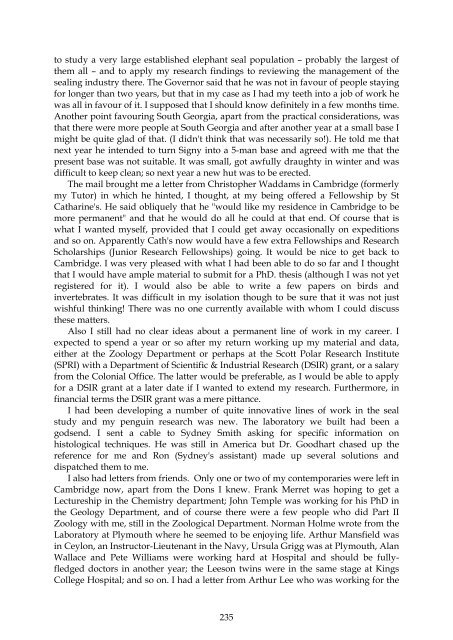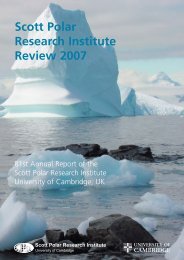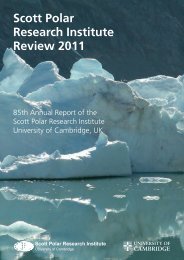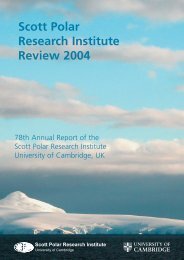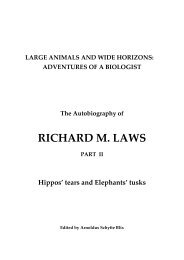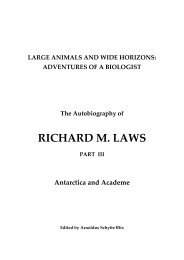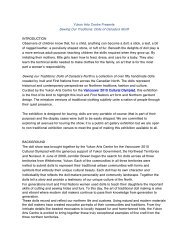- Page 1:
LARGE ANIMALS AND WIDE HORIZONS: AD
- Page 5:
FOREWORD When Richard M. Laws retir
- Page 8 and 9:
we might say today and led to deep
- Page 10 and 11:
We collaborated with the Royal Navy
- Page 13 and 14:
Chapter 1 Northumberland: Boy on th
- Page 15 and 16:
occasional nugget for money. The po
- Page 17 and 18:
to the cheers of the supporters. Cr
- Page 19 and 20:
from the allotments. I can still ta
- Page 21 and 22:
From my perspective local politics
- Page 23 and 24:
Because we returned each year for s
- Page 25 and 26:
uined abbey and a castle on a rocky
- Page 27 and 28:
a new lightweight "Raleigh" bicycle
- Page 29 and 30:
Chapter 2 Exploring the Lake Distri
- Page 31 and 32:
snow, catching the light and shadow
- Page 33 and 34:
keen climber and member of the Fell
- Page 35 and 36:
irds; stones and rocks abounded and
- Page 37 and 38:
The old school buildings were in Cu
- Page 39 and 40:
on mycorrhiza (the beneficial close
- Page 41 and 42:
inculcated self-reliance and practi
- Page 43 and 44:
who came by boat across the lake. S
- Page 45 and 46:
need of rest from the incessant air
- Page 47 and 48:
matter!" One Saturday in May l941 I
- Page 49 and 50:
straightforward until we came to th
- Page 51 and 52:
was still another 2 1 2 miles acros
- Page 53 and 54:
very strange as he was evidently a
- Page 55 and 56:
anything like it, hadn’t the fain
- Page 57 and 58:
Chapter 3 A Cambridge Student I tra
- Page 59 and 60:
stodgy dried egg omelettes late at
- Page 61 and 62:
never saw him because he cut most o
- Page 63 and 64:
patrolled the DR. At the end of eac
- Page 65 and 66:
Cultural influences at that time Sy
- Page 67 and 68:
Reading parties and vacation work I
- Page 69 and 70:
Holme, Ken Ashby, Alan Cock, Elspet
- Page 71 and 72:
Brian had done some novel work on p
- Page 73:
went up to Topsham and sampled the
- Page 76 and 77:
Office. Brian and Colin were biolog
- Page 78 and 79:
Islands and the Debenham Islands (i
- Page 80 and 81:
observations of their behaviour. I
- Page 82 and 83:
I was sorry to miss my elder brothe
- Page 84 and 85:
suspected it might have been the re
- Page 86 and 87:
The menu was: Soup - Turkey Sage an
- Page 88 and 89:
adjust the binocular focus to watch
- Page 90 and 91:
On New Year’s Eve it was extremel
- Page 92 and 93:
them off the ship, into the launch
- Page 94 and 95:
and the others followed in quick su
- Page 96 and 97:
in South Georgia and today the stew
- Page 98 and 99:
Of bawdy laughter penetrate Unto th
- Page 100 and 101:
Will be safe to step on and drink B
- Page 102 and 103:
anaesthetic - Pentathol - required
- Page 104 and 105:
After a very enjoyable and noisy ev
- Page 106 and 107:
chorus girl from Leicester. David a
- Page 108 and 109:
The Falkland Islands Then, at 4.45
- Page 110 and 111:
Next day I was on galley duty so th
- Page 112 and 113:
anchiae, and a large encrusting spo
- Page 114 and 115:
meet Derek. They were out but I fou
- Page 116 and 117:
was a black terminal band to the ta
- Page 118 and 119:
midsummer when some begin to get di
- Page 120 and 121:
ehind, about 70 feet above sea leve
- Page 122 and 123:
times during l929-1937. In l931/32
- Page 124 and 125:
leading to North Point is more or l
- Page 126 and 127:
seldom below -12°C. In terms of hu
- Page 128 and 129:
the ice faces of the peaks and the
- Page 130 and 131:
filled the gaps with wood wool and
- Page 132 and 133:
Work continued on the fitting out a
- Page 134 and 135:
Hill (907ft). This is the highest p
- Page 136 and 137:
A fortnight later, we decided to go
- Page 138 and 139:
Giant petrel colonies were numerous
- Page 140 and 141:
We cut across Orwell Glacier and ro
- Page 142 and 143:
more we set off down - but not befo
- Page 144 and 145:
Derek and I had a look at a rock ex
- Page 146 and 147:
145
- Page 148 and 149:
"the thing that strikes you is that
- Page 150 and 151:
Fuchs to arrange for us to be sent
- Page 152 and 153:
As to rubbish disposal, the site wa
- Page 154 and 155:
lively, questioning mind. He fitted
- Page 156 and 157:
specimens, clothes etc. and there w
- Page 158 and 159:
ut healed fairly quickly. I caught
- Page 160 and 161:
presence of others got one down. In
- Page 162 and 163:
Cooking. During the winter we were
- Page 164 and 165:
irthday. The birthday cake was very
- Page 166 and 167:
11 February l949 was the anniversar
- Page 168 and 169:
Edward Wilson, the biologist with C
- Page 170 and 171:
fortunate, as apart from a few nove
- Page 172 and 173:
4 ft., banking up snow behind some
- Page 174 and 175:
173
- Page 176 and 177:
eflected in the writing. Summer l94
- Page 178 and 179:
1.2°C and +1 °C, there was a cont
- Page 180 and 181:
was a touch green in hue. A few sno
- Page 182 and 183:
completely broke up the ice in the
- Page 184 and 185:
then shot up to -4°C overnight, fa
- Page 186 and 187: sudden deepening from 2 ft to 5 ft
- Page 188 and 189: accessible. We had breakfast and lo
- Page 190 and 191: its fore-flippers. I took a series
- Page 192 and 193: fine sunset effect on the Coronatio
- Page 194 and 195: mauve, violet, purple, deep blue, o
- Page 196 and 197: full of brash ice and small growler
- Page 198 and 199: came in squalls, which tended to pu
- Page 200 and 201: was fitter than the others because
- Page 202 and 203: immatures had been absent for some
- Page 204 and 205: possible to lie full length, even d
- Page 206 and 207: should provide about 4 500 calories
- Page 208 and 209: as was standard practice, because o
- Page 210 and 211: journey of about the same duration
- Page 212 and 213: journey, asking for details. Derek
- Page 214 and 215: It was a misty day when I looked ou
- Page 216 and 217: to my bosom, while Derek fiddled wi
- Page 218 and 219: with the Sandefjord Twins behind it
- Page 220 and 221: On 1 August the temperature was -14
- Page 222 and 223: sledge. He was bleeding from one or
- Page 224 and 225: sledge slightly differently, with t
- Page 226 and 227: two-year stock of food, clothing (t
- Page 228 and 229: In mid-July we listened to the FIDS
- Page 230 and 231: We heard that the "John Biscoe" had
- Page 232 and 233: The ships left on 5 December. I was
- Page 234 and 235: 18!); also various thermometers, st
- Page 238 and 239: year. In May 1949 I pursued the pro
- Page 240 and 241: specimens back myself under my pers
- Page 242 and 243: Swedish-British expedition so as to
- Page 244 and 245: 243
- Page 246 and 247: Signy. The leopard is supposed to b
- Page 248 and 249: possible. The shore here was deeply
- Page 250 and 251: and it was then time for lunch. The
- Page 252 and 253: couldn't move and there was nothing
- Page 254 and 255: unpleasant and salutary incident il
- Page 256 and 257: while I watched for an hour in a sn
- Page 258 and 259: the webs. As Ralph walked away all
- Page 260 and 261: Cow ‘green 7’ flipped snow onto
- Page 262 and 263: (medical) stretcher to weigh the el
- Page 264 and 265: another bull approached to some 60
- Page 266 and 267: the harem. From this it appeared th
- Page 268 and 269: Weddell - probably a 3-yr old femal
- Page 270 and 271: cleaned the skin; lighting a fire a
- Page 272 and 273: Two other females seemed to be ‘e
- Page 274 and 275: proved to be pregnant. Next day a m
- Page 276 and 277: mother had a large bloodstained sca
- Page 278 and 279: attle-scarred males. There appeared
- Page 280 and 281: side to side on the pup’s body as
- Page 282 and 283: the young Weddell pups. We put flip
- Page 284 and 285: 283
- Page 286 and 287:
The only other birds were the Antar
- Page 288 and 289:
In the next few days we watched Dom
- Page 290 and 291:
grating, chirring noise and I locat
- Page 292 and 293:
shrimping net. He put up the terns,
- Page 294 and 295:
one's fingers are anywhere near the
- Page 296 and 297:
wings. The undersurface of the body
- Page 298 and 299:
notice. It was restless, scratching
- Page 300 and 301:
I began to construct what I called
- Page 302 and 303:
A week later, penguins were still a
- Page 304 and 305:
fish's? There was a lovely tern chi
- Page 306 and 307:
e sure of identification in future.
- Page 308 and 309:
lew about all over the place. They
- Page 310 and 311:
appeared to be formed but occasiona
- Page 312 and 313:
gentoos and Adélies - stopping and
- Page 314 and 315:
first skua egg near Balin Point. Th
- Page 316 and 317:
we helped with the feeding process,
- Page 318 and 319:
in order to introduce the species t
- Page 320 and 321:
wine, examples of Madeira needlewor
- Page 322 and 323:
and visited each other in our respe
- Page 324 and 325:
several years published a short pap
- Page 326 and 327:
about obtaining registration for th
- Page 328 and 329:
She had been thinking about visitin
- Page 330 and 331:
got up to go he said, "Oh, by the w
- Page 332 and 333:
a grazing tussock beetle was the cu
- Page 334 and 335:
showed up startlingly. We put the s
- Page 336 and 337:
‘hairy’ fringe over the cliff e
- Page 338 and 339:
New Island, Beaver Island and Wedde
- Page 340 and 341:
where we still hoped to land, weath
- Page 342 and 343:
The evening passed quickly with tea
- Page 344 and 345:
and then headed towards Albemarle R
- Page 346 and 347:
were towed back to the station and
- Page 348 and 349:
This was the first station to be es
- Page 350 and 351:
dryers, the guano store, would be f
- Page 352 and 353:
Hestesletten of Mt Paget (2915m) an
- Page 354 and 355:
and the light administrative duties
- Page 356 and 357:
on the rocks. We launched the dingh
- Page 358 and 359:
(formerly to Lever Bros.). The wind
- Page 360 and 361:
Most of the charts of South Georgia
- Page 362 and 363:
flensed from the seal in eight stri
- Page 364 and 365:
However, the chart appeared to be s
- Page 366 and 367:
to the almost landlocked inner bay.
- Page 368 and 369:
lock of rock. We erected the two te
- Page 370 and 371:
ow back to Grytviken along the oute
- Page 372 and 373:
the cows red-tail. Two of the cows
- Page 374 and 375:
(bull O) had 14 cows and 2 pups. Bu
- Page 376 and 377:
In area 10 there was one harem of 2
- Page 378 and 379:
1 October was a fine morning with l
- Page 380 and 381:
In area 6 several cows had hauled o
- Page 382 and 383:
them a most interesting monster - S
- Page 384 and 385:
There were two harems in area 11, o
- Page 386 and 387:
the cows and creates a bank in the
- Page 388 and 389:
Then the pup slid out in a rush at
- Page 390 and 391:
Discovery Point and more extensive
- Page 392 and 393:
depart on the first visit of Biscoe
- Page 394 and 395:
of it, although her motor boat made
- Page 396 and 397:
The South Georgia Survey team had h
- Page 398 and 399:
397
- Page 400 and 401:
for lunch on the way for steaks and
- Page 402 and 403:
An Arctic Voyage. A friend from ear
- Page 404 and 405:
We did three bottom temperature cas
- Page 406 and 407:
gone to a dentist in England - anot
- Page 408 and 409:
As the trawlers lay all night gutti
- Page 410 and 411:
At that time FIDS had no future job
- Page 412 and 413:
411
- Page 414 and 415:
cutters of 30 to 40 tons that were
- Page 416 and 417:
eginning of April, but since Novemb
- Page 418 and 419:
and 316 kg of meat and bone meal. F
- Page 420 and 421:
the total annual catch. But a decli
- Page 422 and 423:
were stable and natural mortality r
- Page 424 and 425:
population - the initial cohort - w
- Page 426 and 427:
so far. In fact the average oil yie
- Page 428 and 429:
In 1963 sub-let its lease to the in
- Page 430 and 431:
In the event, when I became Directo
- Page 432 and 433:
departure was delayed and we weren'
- Page 434 and 435:
There was not too much to do and I
- Page 436 and 437:
On 30 November, a few hours sailing
- Page 438 and 439:
equivalent to one blue whale, two f
- Page 440 and 441:
sperm whale work. Worked till eight
- Page 442 and 443:
time on the whaling grounds. We had
- Page 444 and 445:
from the stern. One was hauled aboa
- Page 446 and 447:
oil and yesterday the expedition
- Page 448 and 449:
say, to avoid going over the side,
- Page 450 and 451:
was a bitterly cold wind on deck. I
- Page 452 and 453:
long low black cloud on the horizon
- Page 454 and 455:
uoy, with a wire loop through which
- Page 456 and 457:
managed to avoid the ice floes; had
- Page 458 and 459:
word because they told me that it s
- Page 460 and 461:
Then to Haut Bay, which was very be
- Page 462 and 463:
keen sense of humour and stimulatin
- Page 464 and 465:
Taking a picnic we drove to Carvoer
- Page 466 and 467:
illiantly coloured and the calcite
- Page 468 and 469:
Because of the Navy's great interes
- Page 470 and 471:
Arthur Stride, was a marine geologi
- Page 472 and 473:
work on Balaena. and would be bette
- Page 474 and 475:
In l958 I was an invited speaker at
- Page 476 and 477:
Molde and had lunch at the hotel. T
- Page 478 and 479:
patches of sun. The ferry called at
- Page 480 and 481:
479
- Page 482 and 483:
Scotland and the Hebrides, about my
- Page 484 and 485:
Next day Brenda was off Rona at mid
- Page 486 and 487:
We spent a little time that day on
- Page 488 and 489:
cleft in the rocks - it was unable
- Page 490 and 491:
inspected the landing place to asce


